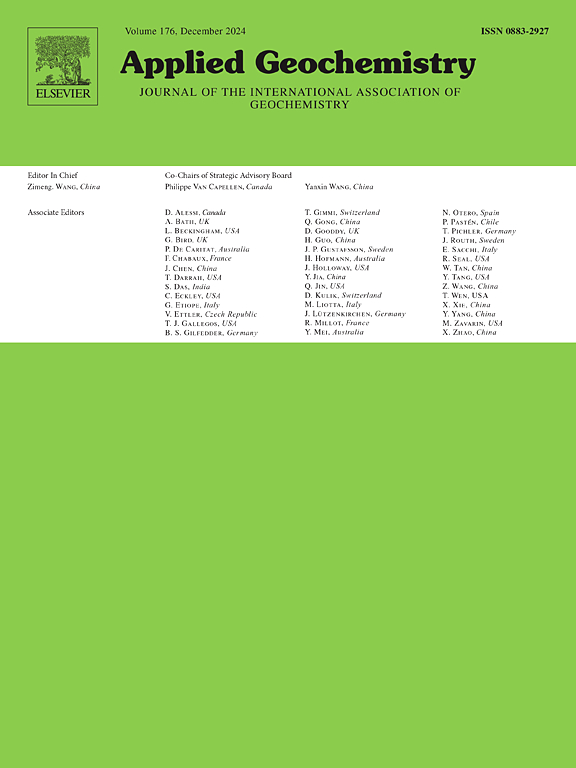Indication of triple oxygen isotopes to replenishment mechanisms and evaporation processes in Yongding River Basin, North China
IF 3.4
3区 地球科学
Q1 GEOCHEMISTRY & GEOPHYSICS
引用次数: 0
Abstract
Urban rivers are important water sources for surrounding agglomerations. Understanding their hydrological processes is crucial for the sustainable water resource development. However, driven by societal demands, extensive human projects to rivers have introduced uncertain consequences for the water cycle in the basin. Therefore, employing the advanced triple oxygen isotopes technique and correlation analysis, the study examined the effects of human intervention on urban river hydrology in Beijing-Tianjin-Hebei region. The results illustrated that the average values of δ2H, δ18O and δ17O were at a high level, which effectively reflect the influence of human activities. In conjunction with previous studies, the supplementary effects of anthropogenic water sources and natural replenishment on river discharge were investigated. Besides, the additional evaporation caused by artificial water retention was quantified by using the isotope model. The results elucidated that Guanting Reservoir caused 8.7 % evaporation across the river, and a substantial volume of agricultural water also promoted the evaporation of local river sections. Overall, the study reveals the triple oxygen isotopes signatures in urban rivers, deeply explores and quantifies the effect of anthropic activities on the water cycle process, offering a scientific foundation for the continuable exploitation of regional water resources.
三氧同位素对永定河流域补给机制和蒸发过程的指示
城市河流是周边城市群的重要水源。了解它们的水文过程对水资源的可持续发展至关重要。然而,在社会需求的驱动下,广泛的人类工程对河流造成了不确定的后果,对流域的水循环。为此,采用先进的三氧同位素技术和相关分析,研究了人为干预对京津冀地区城市河流水文的影响。结果表明,δ2H、δ18O和δ17O的平均值处于较高水平,有效反映了人类活动的影响。结合前人的研究,探讨了人为水源和自然补给对河流流量的补充效应。此外,利用同位素模型对人工保水引起的额外蒸发量进行了量化。结果表明,官厅水库对整个流域的蒸发量产生了8.7%的影响,大量的农业用水也促进了当地河段的蒸发量。总体而言,研究揭示了城市河流的三氧同位素特征,深入探索和量化了人类活动对水循环过程的影响,为区域水资源的可持续利用提供了科学依据。
本文章由计算机程序翻译,如有差异,请以英文原文为准。
求助全文
约1分钟内获得全文
求助全文
来源期刊

Applied Geochemistry
地学-地球化学与地球物理
CiteScore
6.10
自引率
8.80%
发文量
272
审稿时长
65 days
期刊介绍:
Applied Geochemistry is an international journal devoted to publication of original research papers, rapid research communications and selected review papers in geochemistry and urban geochemistry which have some practical application to an aspect of human endeavour, such as the preservation of the environment, health, waste disposal and the search for resources. Papers on applications of inorganic, organic and isotope geochemistry and geochemical processes are therefore welcome provided they meet the main criterion. Spatial and temporal monitoring case studies are only of interest to our international readership if they present new ideas of broad application.
Topics covered include: (1) Environmental geochemistry (including natural and anthropogenic aspects, and protection and remediation strategies); (2) Hydrogeochemistry (surface and groundwater); (3) Medical (urban) geochemistry; (4) The search for energy resources (in particular unconventional oil and gas or emerging metal resources); (5) Energy exploitation (in particular geothermal energy and CCS); (6) Upgrading of energy and mineral resources where there is a direct geochemical application; and (7) Waste disposal, including nuclear waste disposal.
 求助内容:
求助内容: 应助结果提醒方式:
应助结果提醒方式:


